

Rickshaw
March 25, 2003
Taxi strike, and we have a train to catch. The fare to the station should be 30 to 40 rupees, but drivers are asking for 200. All that, and they won't even take us all the way to the station for fear of getting their windows smashed by picketers. While we are negotiating with a "private driver," a small man in white strolls up. From his garb I know he is part of a dying breed, a man who pulls other people around in his rickshaw. His offer to take us seems preposterous, it is almost two miles to Sealdah station, we have limited time, and how will we fit in that tiny cart with all of our luggage? Eventually curiosity and our sense of adventure win out, helped by his price of 100 rupees. So, Amy and I climb in and wedge our butts into a seat that is three inches too narrow. Our luggage is piled on top of our laps, and "Strong Man," as he likes to be called, hoists us up and starts moving down Sudder Street.
His pride is obvious as he calls out to the striking taxi drivers and his fellow rickshaw wallahs, bragging about his distant destination and princely fare (most rickshaw fares are 30 rupees or less, and passengers are scarce). We move onto a major
Holi: Festival of Colors
March 18, 2003
Donning a new white t-shirt and swimming trunks I venture on to the street. Foreigners are dancing about with local men, hurling colored dust and water up in the air. The liquid color is rubbed on to people's bodies and printed on their clothes. Even the streets are turning purple. A band moves around the street, keeping the crowd close. Holi is in full swing.


thoroughfare and Strong Man breaks into a trot, his head barely visible as it bobs up and down in front of our bags. Through the whole journey he keeps a running commentary, telling us not to worry, that he is a very strong man, and that we should enjoy ourselves. I am impressed. Amy and I with all of our bags add over 330 pounds to his carriage, which he drags through the streets of Calcutta, parting the crowds with a bell held in one hand. As we glide silently along, taking quiet backstreets when possible, the sun sets and darkness falls. People return home from work, our high perch allows us to glimpse into windows and doors and observe the transition from the working chaos of the streets to a more settled home. Kitchens are bustling, with some of the hot work of cooking spilling right out onto the relatively cool streets. In anticipation of dinner children's play edges ever closer to home.
Strong Man's endurance proves itself to the task and we arrive at the station in plenty of time to catch the Darjeeling Mail. He is only a little breathless, his shirt is soaked with

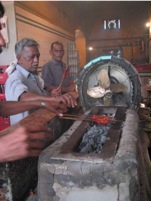
sweat, but without him our time in Calcutta would have been that much poorer.
Note: After a few weeks up in the Himalayas we returned to Calcutta. Taxi fares were up and we managed to find Strong Man again, happy to see us and still bragging about his 100-rupee fare.
--Z
Children are everywhere, having fun, making mischief. It is interesting to watch the children from the local houses play with the street kids. The distinction is clear, the haves and have nots. But children are usually ignorant of these differences and caste-ridden India, for the most part, is no exception. Colored powder is shared and alliances are formed and broken, but the squirt guns remain in the hands of the privileged.
One child in particular stands out (his photo is on West Bengal). I first saw him yesterday, around 7 years old, dull eyes, a gap in his teeth, forlorn, begging in the street. Today he is a new boy. I find him high in the air on the shoulders of a Scandinavian giant. As the crowd rhythmically shifts around the band he almost always rests on some foreign shoulders. Those few occasions that he is on the ground he looks distraught, wandering around the tallest celebrants, arms held high, pleading to be hoisted aloft. Refusal increases his distress until he is up again. Once airborne his body moves spasmodically, a huge smile on his face, in rapture.
I still wonder about that boy and what it must be like to live with positive human contact only one day a year.
--Z

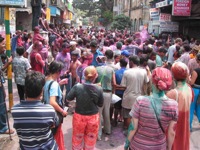

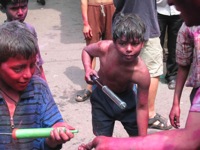

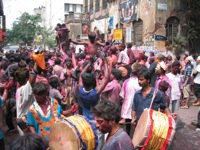



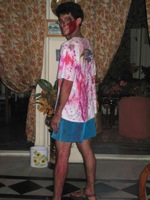

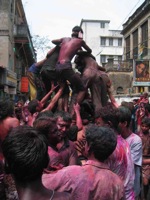

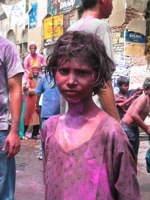

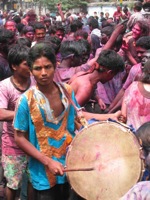

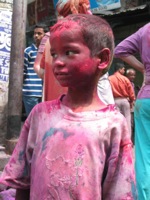
Photographs and Text: Copyright 2002 & 2003, Zachary Maler & Amy Leffert